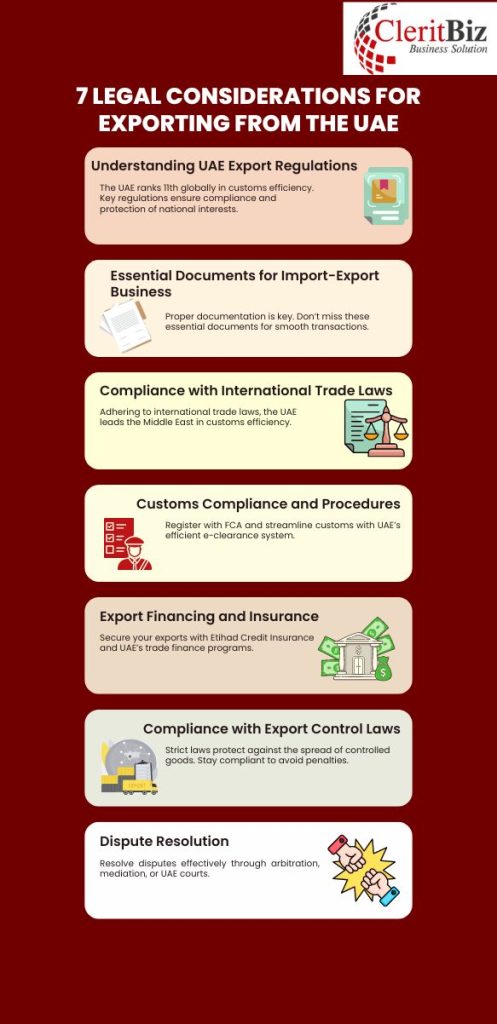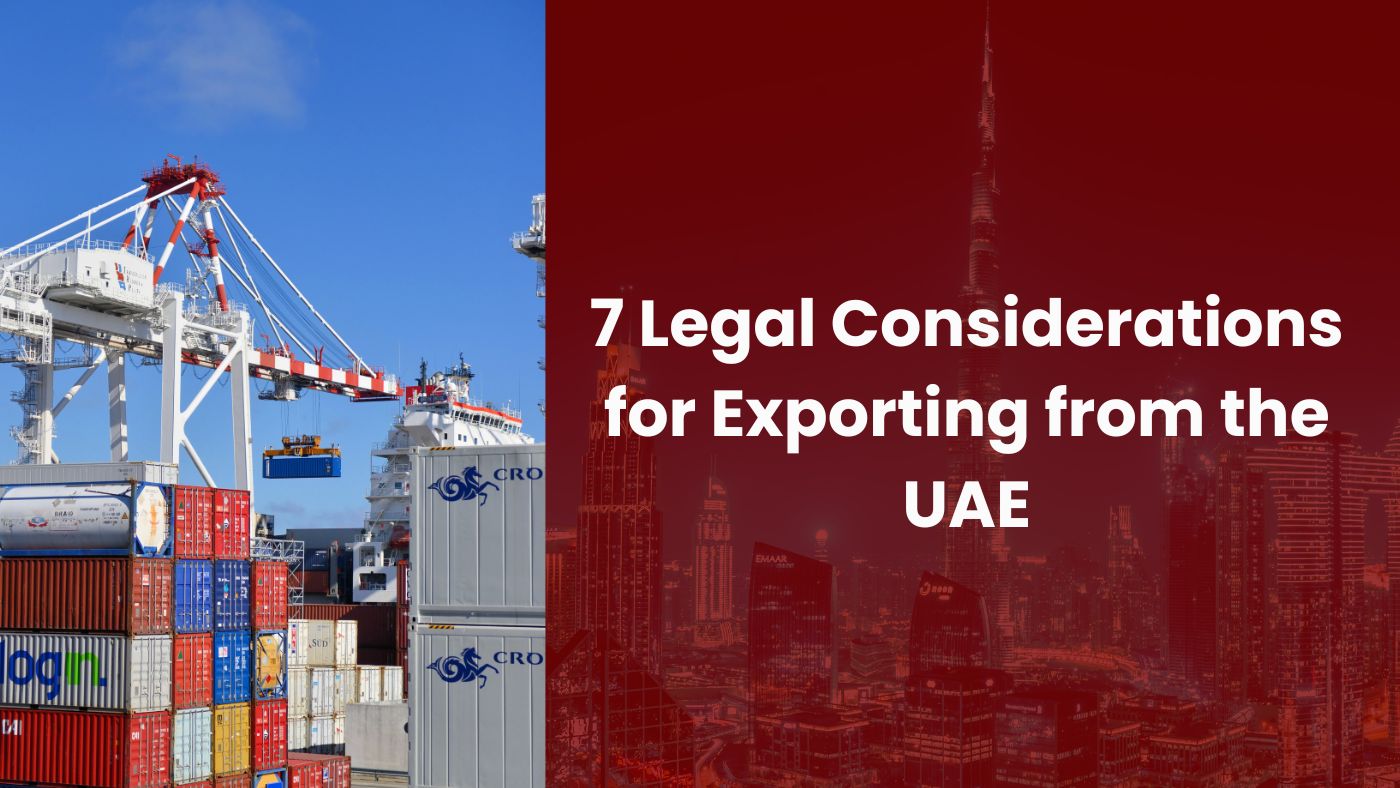The United Arab Emirates (UAE) is a dynamic hub for global trade, strategically positioned between Europe, Asia, and Africa. With its world-class infrastructure, favorable business environment, and robust legal framework, the UAE has become one of the most attractive destinations for business setup in the UAE and for businesses seeking to expand their reach globally. In 2022, the UAE’s non-oil exports reached a new record of AED 366 billion, reflecting a 6% increase from the previous year.
This growth underscores the increasing importance of exports in the UAE’s economy and the strategic benefits of establishing a business in this thriving market.
As the UAE continues to diversify its economy away from oil dependency, the export sector plays a very important role in driving economic growth and enhancing global trade connections. However, to capitalize on these opportunities, businesses must navigate a complex web of legal regulations.
Here’s a guide to the essential legal considerations for exporting from the UAE.

1. Understanding UAE Export Regulations
The UAE has a well-established legal framework for exports, designed to ensure compliance with international trade laws and to protect national interests.
The customs and border management processes of the UAE rank 11th globally, according to the World Bank’s Logistics Performance Index (LPI) for 2022.
Exporters must familiarize themselves with the regulations set by the UAE’s Federal Customs Authority (FCA) and the local customs departments of each emirate.
Key Regulations Include:
- Customs Duties and Tariffs: The UAE applies a standard customs duty on most goods, with some items being exempt. For instance, goods exported to other Gulf Cooperation Council (GCC) countries are often exempt from tariffs due to the GCC Customs Union.
- Export Licenses: The UAE issues a substantial number of export licenses each year, reflecting the diverse range of goods and services exported from the country. Certain goods, like technology, pharmaceuticals, and weapons, require specific licenses. Understanding the licensing procedure for starting an export business in the UAE is paramount for compliance and successful business operations.
- Sanctions and Embargoes: The UAE adheres to international sanctions, restricting or entirely prohibiting exports to certain countries or regions.
2. Essential Documents for Import Export Business
Proper documentation is vital for a smooth export process. The UAE’s trade with the world totaled over AED 2.2 trillion in 2022, making accurate documentation essential for managing such large volumes. Knowing the right documents for import export business is key to avoiding delays and ensuring compliance with regulations.
- Commercial Invoice: This document is essential for customs and must include a detailed description of the goods, their value, and the terms of sale.
- Certificate of Origin: The UAE issues a large number of certificates of origin annually, facilitating exports to a wide range of countries. This certificate proves the country of origin of the goods.
- Packing List: Accurate packing lists are essential for preventing delays at customs by providing detailed information about the shipment.
- Bill of Lading/Airway Bill: These documents are a key part of the shipping process, serving as a contract between the exporter and the carrier.
- Export Declaration: The UAE processes a significant volume of export declarations, highlighting the importance of timely and accurate submissions.
To succeed in international trade, you must thoroughly understand the required documents for import and export business. Each document plays a critical role in the customs clearance process and ensures that your business operations are in line with UAE regulations.
3. Compliance with International Trade Laws
The UAE is a member of the World Trade Organization (WTO) and adheres to international trade laws and agreements. Global assessments recognize the UAE as a leader in customs efficiency in the Middle East.
- Product Standards and CertificationMany countries require products to meet specific standards for legal import. For example, electrical products exported to Europe must comply with CE marking requirements.
- Intellectual Property Rights (IPR): The UAE consistently addresses cases of intellectual property infringement, highlighting the necessity for exporters to protect their trademarks, patents, and copyrights.
- Anti-Dumping and Countervailing Measures: The UAE actively participates in WTO discussions on anti-dumping measures, which are essential for preventing the export of goods at unfairly low prices.
4. Customs Compliance and Procedures
Navigating UAE customs procedures is a critical aspect of exporting. Global assessments recognize the UAE as a leader in customs efficiency in the Middle East.
- Register with the Federal Customs Authority (FCA): All exporters must be registered with the FCA to legally export goods from the UAE. A significant number of businesses are registered with the FCA, highlighting the importance of this requirement.
- Use the e-clearance System: The UAE’s digital customs clearance system handles a large volume of transactions annually, making it one of the most efficient systems globally.
- Understand Free Zones Regulations: The UAE has numerous free zones, each with its own set of regulations. These free zones are major hubs for export activities, contributing significantly to the UAE’s overall export volume.
5. Export Financing and Insurance
Financial and insurance aspects are high-priority for exports. The UAE’s export credit agency, Etihad Credit Insurance (ECI), supports non-oil exports and offers various financial services.
Key Points Include:
- Letters of Credit: A secure payment method used extensively in international trade.
- Export Credit Insurance: ECI provides insurance against non-payment risks for exporters.
- Trade Finance Programs: UAE banks offer programs to support exporters with working capital and financial assistance.
6. Compliance with Export Control Laws
UAE export control laws are in place to prevent the spread of weapons and controlled goods. Violations result in significant fines.
Considerations Include:
- Dual-Use Goods: Export requires special permits for items like chemicals or technology.
- Controlled Substances: Strict regulations apply, with severe penalties for non-compliance.
7. Dispute Resolution
Exporters often face disputes over contracts, payments, or delivery terms. Clear dispute resolution clauses in export contracts are critical.
- Arbitration: The Dubai International Arbitration Centre (DIAC) is a popular choice for resolving export-related disputes, handling numerous cases annually.
- Mediation: This less formal, cost-effective method is increasingly used in the UAE to resolve disputes quickly.
- Litigation: When arbitration or mediation fails, disputes can be taken to UAE courts. However, litigation can be lengthy and expensive.
Conclusion
Exporting from the UAE offers significant opportunities for businesses looking to expand into global markets. With non-oil exports reaching record levels and the UAE’s strategic position as a global trade hub, the potential is immense. However, understanding and complying with the legal requirements is required to avoid potential pitfalls.
By familiarizing yourself with UAE export regulations, documentation requirements—especially the documents for import export business—international trade laws, and customs procedures, you can ensure a smooth and successful export process.
Additionally, securing proper financing and insurance, adhering to export control laws, and being prepared for dispute resolution will further safeguard your business operations in this rapidly growing export market.

